If we were to have a duel of hotels versus hostels, which do you think would be the final winner? As the contenders enter the ring, ready to showcase their strengths, the question lingers, which will claim the title as the traveler’s ultimate choice?
The answer is simple: it depends on what matters most to you and what you are looking for in your accommodation.
To help you decide on the pros and cons of each option, we have laid out all the key decision factors and compared hostels with hotels in the summary table below.
| FEATURE | HOSTELS | HOTELS | WINNER |
|---|---|---|---|
| COST | Most affordable, especially in a shared dorm | Rates vary by category but the only comparable rates are for budget hotels against private ensuite rooms in hostels where prices could be similar | Hostels |
| PRIVACY | Social in nature, and designed for you to mingle. Shared dorm beds offer minimal privacy, private rooms are comparable to budget hotels | Privacy guaranteed in your own room, and more individualistic public spaces. | Hotels |
| SERVICE | Staff is usually friendly and willing to help but have limited customer service / hospitality experience and can be temps with limited local knowledge | Professionally trained hospitality staff with experience in customer care and local knowledge. Butlers and concierges in 4-5 star hotels | Hotels |
| SLEEP QUALITY | Shared dorms can be noisy and busy, and make it hard to have sound sleep. Private rooms offer more quietness but are still subject to outside noise | Higher category hotels are sound proof and designed for great sleep with quality beds, linens and silence | Hotels |
| AMENITIES & FACILITIES | The most basic hostels have shared kitchens, laundry rooms and lounges. Better ones can have swimming pools and restaurants. Limited amenities provided in the room or bathrooms | Amenities provided in the room from basic soap bars to toiletries from luxury brands, spas, gyms, rooftop bars, Michelin-starred restaurants, and so much more | Hotels |
| CONVENIENCE | Largely DIY concept where you need to bring all you’ll need, be self-sufficient and tidy after yourself | Full staff ready to help take care of all your needs from day tours to airport transfers, local guides and recommendations | Hotels |
| SOCIALIZING | Unwritten rule that everyone at a hostel is there to meet others makes it easy to start a conversation with anyone. Activities often organized on a daily basis, social calendar | Individualistic approach; Guests on business or minding their own business. Few to no activities available in house if the hotel is not an all inclusive resort | Hostels |
| SAFETY | Generally safe but requiring you to take care of your belongings, lock everything up and store it in lockers provided (with your own locks) | Rooms that locks, in room safes, security, monitoring systems, alarms and security teams | Hotels |
| LOCATION | Sometimes in central locations but usually one zone away from the premium spots, yet near public transportation access | Often provide the best views, are more likely to be found near main tourist attractions and at premium spots | Hotels/Hostels depending on the purpose of your trip |
| AGE LIMITATIONS | Young travelers still dominate but this is fast changing to a more balanced age distribution. Some hostels are still focused on youth | No age restrictions except for adults-only hotels | Hotels/Hostels |
| CLEANLINESS | Less clean than hotels because of the nature of shared facilities and accommodation and the expectation that others guests will clean after themselves | Daily cleaning of rooms and common spaces and detailed hygiene procedures and protocols | Hotels |
| BATHROOMS | Mostly shared and therefore not squeaky clean or readily available. Can be ensuite in some private rooms | Ensuite and only for you. Regularly cleaned by the staff | Hotels |
Contents
Affordability
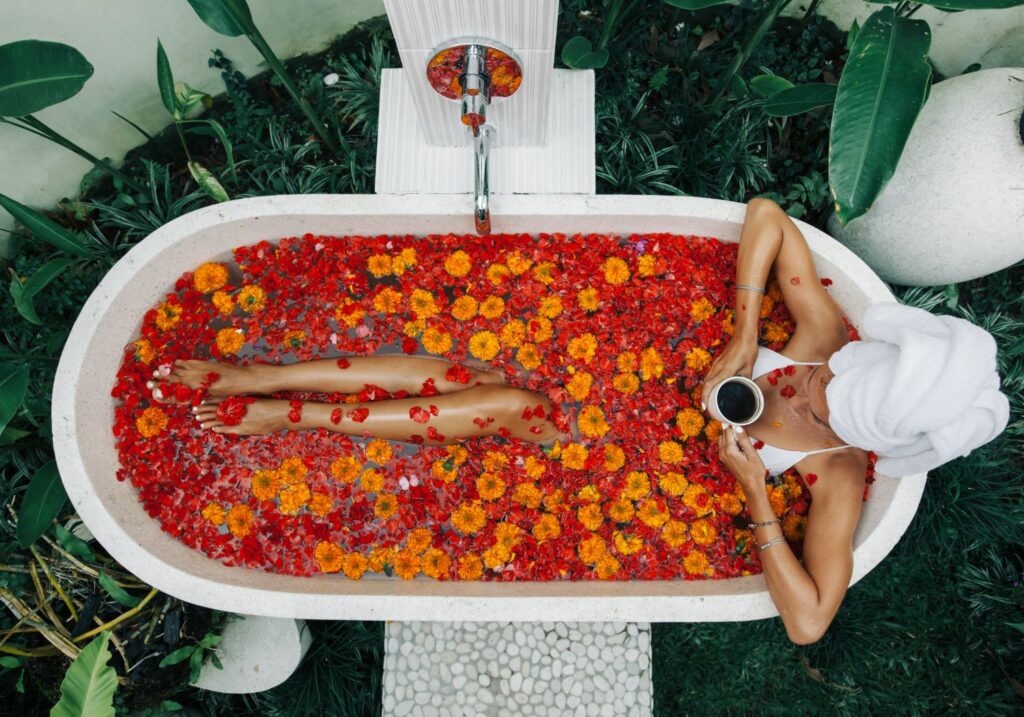
Budget is one of the most important decision factors when choosing your accommodation as a solo female traveler having nobody to share a room with.
About 60% of the respondents of our Solo Female Travel Survey indicated that price is Important or Very Important when deciding on a travel provider and this is most relevant when deciding on your accommodation if you are traveling solo and have nobody to share with.
If you are looking for the most affordable option, hostels will always outrank hotels because of the simple fact that they tend to offer shared accommodation as opposed to private accommodations, and because they charge per person and not per room.
If you have nobody to split the costs of a hotel room with and are comfortable sharing a dorm room with strangers, you will always find hostels are cheaper than hotels.
Let’s compare the two in more detail.
Hostels
Hostels are the no frills version of low cost airlines and have historically been a haven for budget travelers and one of the best ways to save money when traveling.
Ever since the first Youth Hostel opened up in the early 20th century in Germany, they have offered a safe space for typically young travelers looking to explore the world in the cheapest way possible while still having access to a shower.
They keep their prices low because they offer dorm-style rooms with bunk beds and shared facilities including bathrooms, kitchens to cook your meals and lounges.
Instead of charging per room and assuming two people sharing, hostels charge per person.
Hotels
You really get what you pay for when it comes to accommodation on the road and even 2 and 3-star hotels tend to be more expensive than hostels because they provide private and ensuite accommodation just for you, as opposed to shared dorms and bathrooms.
The bigger personal space and the privacy offered by having your own room directly correlates to the room rate and makes hotels more expensive even though we are not comparing the same product.
While premium hostels are starting to pop up, they can never reach the level of luxury that 5-star hotels can offer, with their expansive rooms, fully staffed penthouse suites, premium amenities, personal butlers at your service and Michelin-starred meals.
If you are traveling with someone, the cost of a hotel will be split and you can have access to much better options than when you are traveling solo. This creates the appearance that hotels charge single supplements when the issue is that they charge per room and room prices (without breakfast) tend to cost the same whether there are one or two guests.
Pro tip: Many 3 and 4 star hotels in Europe and elsewhere offer single rooms that are smaller than the regular rooms but offer the same amenities and the rest of the features of a hotel at a cost that is not that dissimilar from single rooms in hostels. Use your favorite hotel aggregator to find them.
Privacy
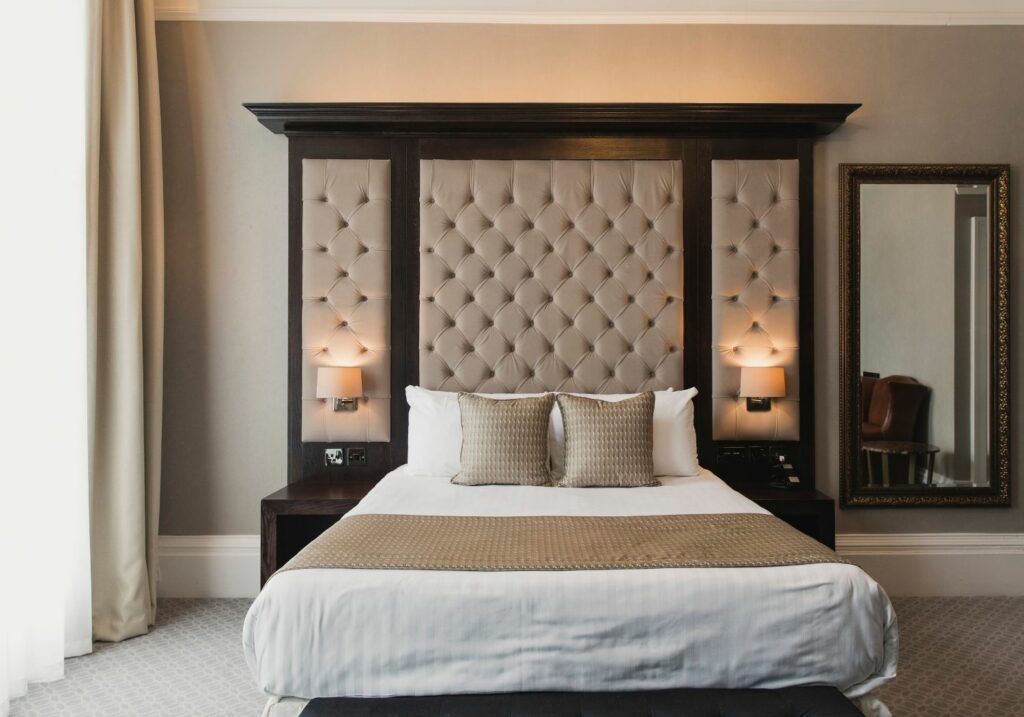
As mentioned in the previous section, price is very much determined by the level of privacy and personal space you get.
The smaller the space dedicated just to yourself, the lower the privacy you are getting, and as a result, the lower the price you will pay.
If privacy is not an issue for you, hostels remain the best option. If it’s a must-have, you will have to book a hotel or a private room in a hostel, often a good compromise.
Hostels
When we talk about hostel accommodation we are usually referring to dormitory-style accommodation where you share a room with others and only have a bunk bed to yourself.
This means there is minimal personal space and all your belongings need to be packed up and stored away in lockers when you leave your room or go to the bathroom.
The degree of privacy you enjoy while sleeping will vary depending on the hostel’s design and the type of room you choose.
Common dorm rooms tend to have bunk beds where the lower bunk has the privacy of a curtain or a design where your head is hidden from plain view, but there isn’t much more privacy beyond that. Bring your own sarong to hang from the bed frame to create a makeshift curtain in the lower bunk bed.
Pro tip: If you need privacy, consider private rooms in hostels as an in-between option that is cheaper than a hotel but more expensive than a dorm and still offers a private space. These rooms can sometimes be ensuite for true privacy, though their price is not far from that of a budget hotel. Many of our community members find this is the best option when traveling solo.
Communal bathrooms mean that you are getting ready in front of everyone else. While showers will have doors or curtains for privacy, you may have to dress or get ready for the day in front of others, be it inside the bathroom stall, under the bed sheets or in other private spaces.
Hotels
Hotels offer private rooms that are solely for your use.
You can retire to your personal space at the end of the day, keep all your belongings in the room without having to pack it all up into a locker, walk around your room naked if you like and sleep without anyone else around, or with a handsome stranger you just met.
While many have no problems inviting their one night stand to their hostel bunk bed, you may prefer the privacy of your own room, which is safer than going to a stranger’s home.
Besides private rooms, which are also possible at hostels, the main advantage of a hotel is the ensuite bathrooms which are core to the experience.
Service levels
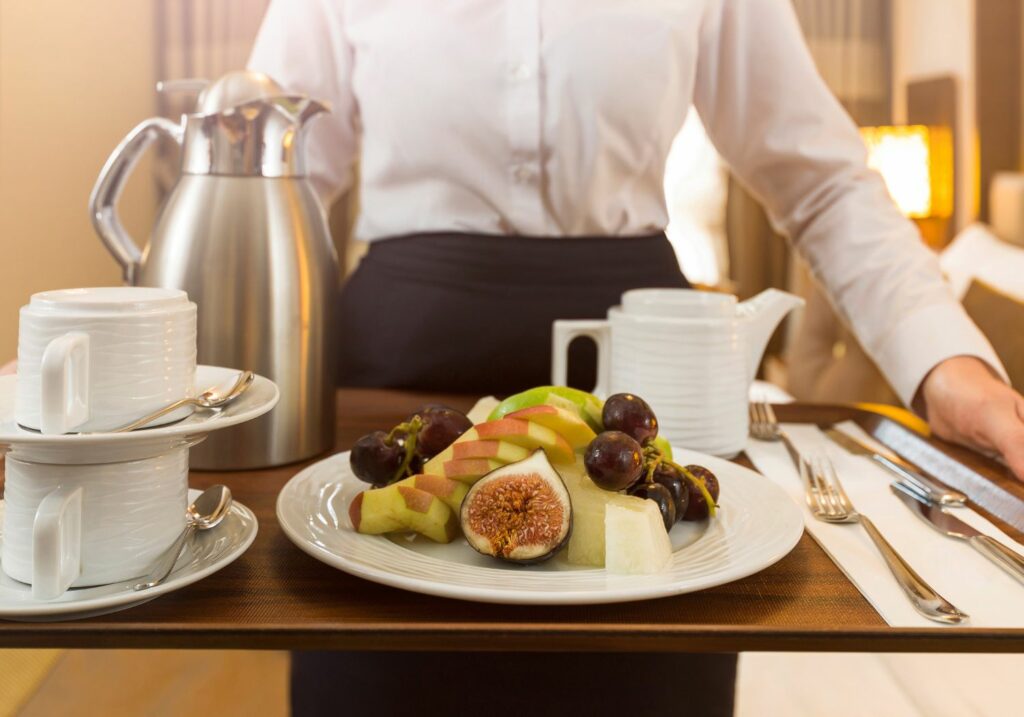
The service levels offered at hotels and hostels are vastly different and while hostel staff is usually very helpful and willing to help with tips and recommendations, a lot of the services you may expect when traveling will not be offered or will be charged.
If you expect a high level of service, a hassle-free stay and someone ready to help resolve any issues, higher category hotels are the answer.
If the level of service offered is not important to you, and you are very much a DIY kind of person ready to do things yourself for a cheaper stay, a lower category hotel or a hostel may be best for you.
Hostels
One of the ways in which hostels keep prices low is by saving on staff costs which results in guests having to do a lot of things themselves.
From making your own bed, to tidying after yourself if you use the kitchen and generally being a low-maintenance guest, hostels provide minimal levels of service.
There is no room service, no housekeeping, minimal cleaning and definitively nobody folding or hanging the clothes you left on the chair when you went out for the day.
Many hostels also keep HR costs low by hiring temporary workers such as backpackers on the move, on a volunteer basis in exchange for free accommodation and sometimes boarding.
They have no long term commitment to the job or to providing a high level of service, often minimal to no training in hospitality or customer service and their experience with the location may only be marginally better than yours.
This results in haphazard and unreliable customer service levels you can’t rely on and a more superficial level of knowledge of the destination that has been passed down by the previous volunteer or documented in procedures created by management rather than from personal experience.
Hostel staff may be helpful in providing tips for getting around or for places to eat and things to do, they may even help organize events or tours, foster a social environment for you to mingle with others and provide tips on solo travel, but could be ill-equipped to handle challenging situations such as conflict between guests, sexual harassment or any kinds of complaints.
They may have limited on-site services compared to hotels, with fewer amenities and a less formal approach to guest services. In brief, they aren’t going to make your restaurant reservations or organize your taxi, but they will for sure help you find a way to do that yourself.
Hotels
One of the main advantages of staying at a hotel is the service level that comes with it, especially at the higher end of the scale. Hotels are classified based on their service levels among other things.
While this could be hit and miss at a 3-star hotel, you should have high expectations at a 4 and 5-star hotel, including standard cleaning and housekeeping services as well as a concierge desk or even a butler.
There are many things hotel concierge can help you with. They can organize your airport pick up, lend you a mobile phone to use while in the country, get tickets for a sold out event or find a driver at short notice to take you on an excursion for the day. When they aren’t available, reception teams should fill that space.
As a solo female traveler, the levels of service offered by a hotel can help mitigate some of the risks of traveling solo and address a lot of the concerns raised by women traveling on their own.
From sending a reliable driver to pick you up if you got lost or went out to dinner, to finding a high quality and vetted day trip guide, picking you up from the airport or even escorting you to a local ATM to withdraw cash, hotel staff can provide a lot of peace of mind to solo travelers.
Sleep quality
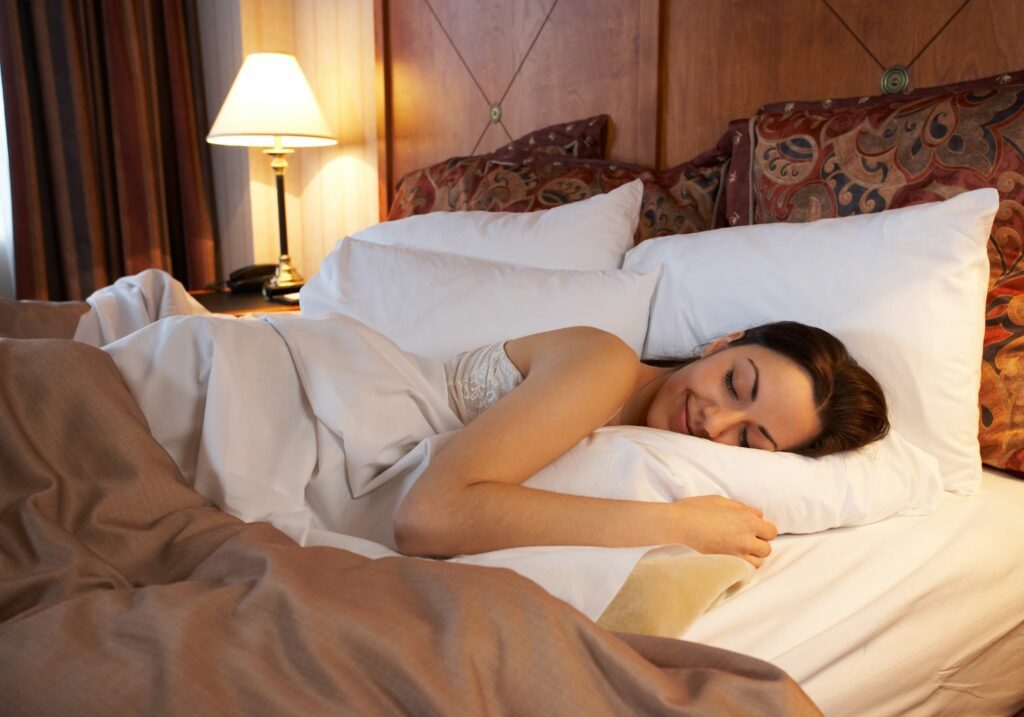
Sleep quality has been linked to many benefits and is even more important when traveling. Having to adapt to a completely new environment and battling jet lag increases sleep disruption and its associated risks.
Your brain does not like sleeping in a new place that is not the one you are used to. Challenges are more likely to present themselves in a hostel than a hotel.
With privacy and having your own personal space, quality amenities and service levels comes an environment that is more conducive to a restful night than if you have to share a dorm with others who may be inconsiderate.
Hostels
One of the main hostel deterrents is the fact that you will be sleeping in a shared dorm with a bunch of strangers who may not be as mindful and respectful as you’d like them to be when it comes to sharing a sleeping space.
Alarms going off at an ungodly hour, roommates coming in and out throughout the night, parties with loud music on the rooftop or common areas and snoring are some of the most commonly mentioned downsides of hostel dorms.
While this concern can be partially addressed by staying in a private room, no hostel will ever compare to a high-end hotel designed with sound proofing, privacy and quality sleep in mind.
Hostels are communal experiences and even the most considerate of dorm rooms will have guests come in and out at different times and whisper during the night. The bigger the dorm room, the higher the chance you’ll be woken up unwillingly.
Because it has been widely proven that a noisy sleep environment contributes to disturbed sleep, hostels are not the best for those who need a good night’s sleep.
Pro tip: You can improve your sleep quality with tools such as the Manta Sleep mask which I have been using to sleep in planes for a long time, or the simple combination of a pair of ear plugs and a sleep mask, but they won’t protect you from the vibrations of the couple getting it on above you, the loud snores of your bunk neighbor or the alarms designed to wake the dead up. To minimize these risks, go for small (4 bunk beds if possible) women-only forms where there is less snoring and sex.
Hotels
With privacy and better facilities and amenities comes better sleep.
High end hotels have become obsessed with sleep quality and are increasingly using that as one of their main selling points.
A standard 4 or 5-star hotel will come with comfortable beds, quality linens, pillow menus, blackout curtains, individually-controlled AC / heating, quiet corridors decked with carpets designed to minimize noise and soundproof windows, thick doors and the quietness of your own space.
What is more, if you have a noisy neighbor, you can always call the reception and ask them to sort it out, while hostels have an unwritten rule of “don’t ask-don’t tell” as long as the nuisance is mild, even if it’s enough to disturb your sleep.
Amenities and Facilities
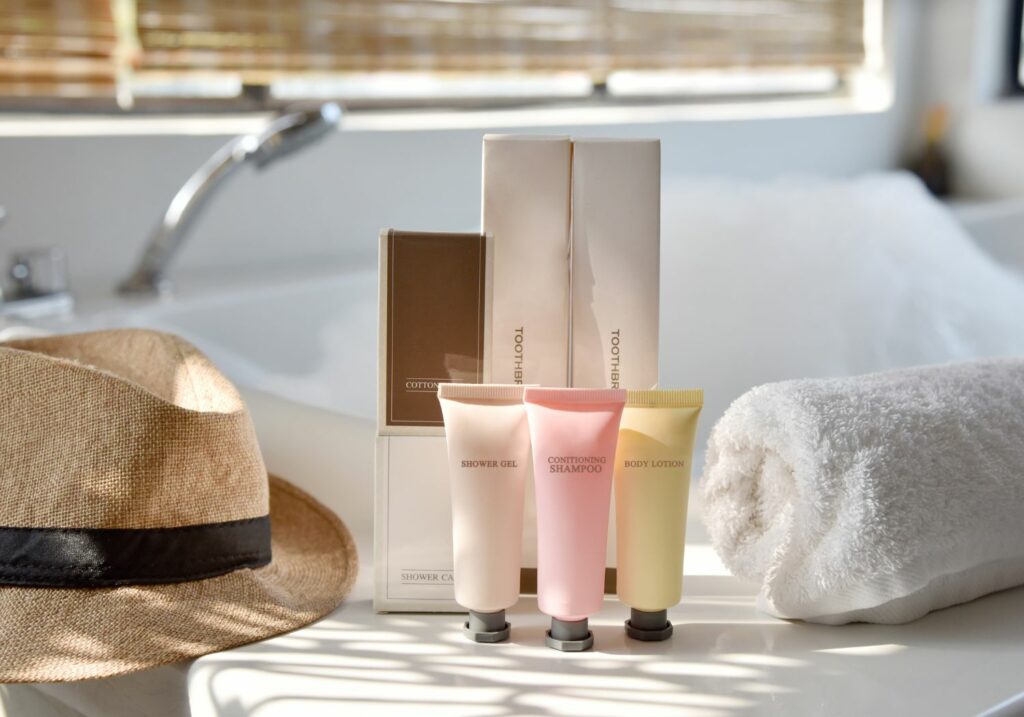
Amenities usually refer to items available in your room such as towels, shampoo, body wash, hair conditioner, hair dryers, phones, etc. while facilities relate to infrastructure, that is, what’s on offer at the hotel, such as WiFi, bars, gyms, a spa, breakfast, restaurants, common areas, and so on.
When looking at both of these, it is clear that hotels offer more than hostels, which tend to be more bare bones and limited in what they provide besides a bed to sleep in.
If you stay at a hostel, you are expected to bring most of the given hotel amenities with you including toiletries, towels, and so on.
That being said, as solo travel continues to boom, more hostels are evolving into poshtels that are closer to a 3-star hotel, with offering beautiful facilities, great design and high quality bedding, than an inn.
Hostels
What hostels lack in facilities such as gyms or swimming pools, they make up for with more utilitarian things that a budget traveler will appreciate such as laundry rooms with washing machines and dryers or even bicycles for rent.
Things like room service or phones to borrow are not available at hostels but you should expect them to provide linen and pillows in your bed, and they prefer you not to use your own because they don’t know where it’s been and what pests you could be spreading.
You should bring a quick dry towel and all toiletries with you because these are almost never provided, and bear in mind that you won’t be able to leave them in a shared bathroom but will have to pack them back into your suitcase after use (even if they are damp).
Pro tip: A roll-up toiletry bag such as this highly recommended one, is a great way to have all your things handy and hanging, so you don’t have to rest them on wet or unhygienic shared bathrooms.
When it comes to eateries, many hostels have bars or cafeterias for guests to socialize and some even offer basic breakfasts, which is a great perk, but these are less common as they are in hotels, almost all of which offer breakfast onsite.
Hotels
High end hotels are known for providing a range of luxurious amenities, including high-quality toiletries, dry cleaning service, well-stocked minibars and 24 hour room service.
They also come with AC / heating, or at least fans, that you can adjust to your desired temperature, instead of having to suffer through what others may prefer or what the hostel management has set as the standard.
Higher category hotels will offer better facilities than you may enjoy at home including indoor or outdoor heated pools, expansive spas, rooftop bars, salons, even complete shopping arcades with high-end stores.
Lastly, hotels typically offer breakfast either included in your rate or for an extra fee. Some of the breakfast buffets are incredible feasts with the best views to start the day with. These views tend to be reserved to hotels as premium locations usually are.
The hotel we stay at in Munich during our Christmas market trip, the Bayerischen Hoff, offers a premium champagne breakfast with bubbly and mimosas that is the most glamorous way to start the day.
In Fes, during our tour to Morocco, we enjoy a wide spread of local breads and pastries with views over the largest medina in the world.
On our tour to Egypt, breakfast during our stay in Cairo is served poolside with a view of the ancient pyramids and a great selection of mezze.
Convenience
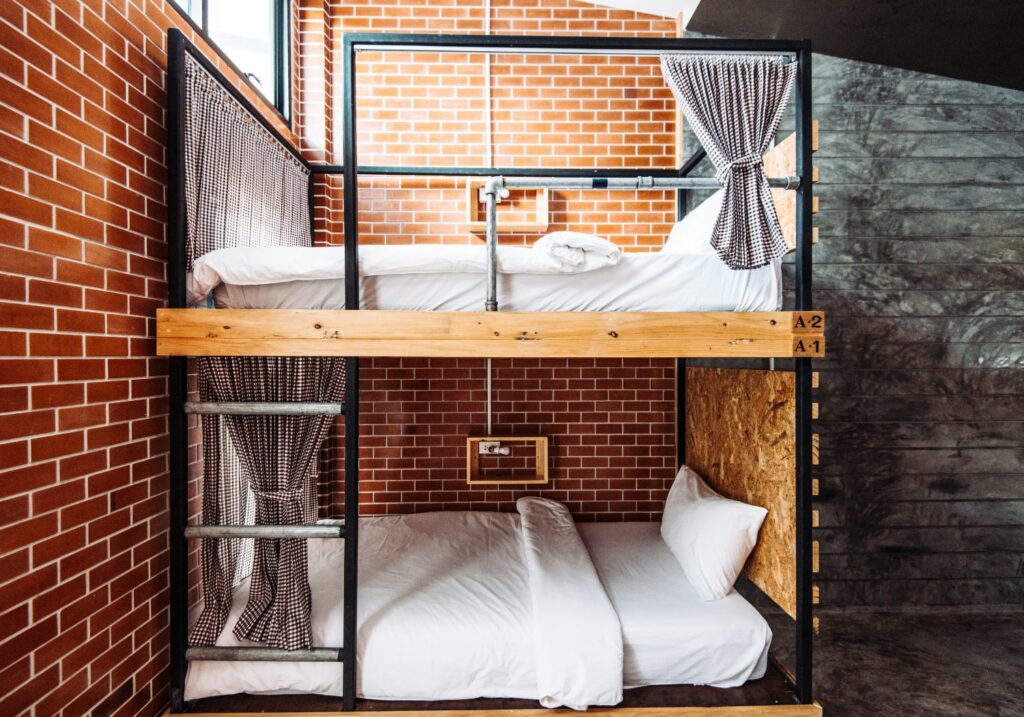
By now you have realized that hostels are a no frills, DIY accommodation option that is designed for socializing and keeps costs low by making you share the space and responsibilities with others.
Like with all industries where there are low cost options, the savings come at the expense of convenience.
Hostels
Several things make hostels a less convenient option.
Firsty, you need to carry lots of what is otherwise provided at hotels with you, including toiletries and towels.
Secondly, in dorm-style accommodation, you need to pack and lock your suitcase or store your belongings in the locker (with your own lock) every time you leave the room or when you are asleep.
Thirdly, not all hostels will have sockets next to your bed, so you may have to charge your electronics inside a locker, use shared sockets or bring a portable charger.
And lastly, shared facilities mean you may have to wait your turn, be it to use the toilet or have a shower, or cook a meal in the shared kitchen, especially during peak hours. All in all, you may have to plan your day around this and not assume that you have free access to the facilities when you need them.
Pro tip: Look for smaller dorm rooms with ensuite bathrooms that will be shared with fewer people and read reviews to confirm lockers are available, how large they are and whether bed-side sockets are available.
Hotels
Hotels outrank hostels when it comes to convenience.
They are private spaces for you to use exclusively, which means that you can leave it all laying around, plug as many things as you want in all the available sockets, and spend as much time as you want in the bathroom.
They also offer a host of services designed to make your stay more comfortable and will take care of a variety of chores for you, from organizing transport to taking care of your laundry, organizing a room service meal or getting your clothes or, your newspaper, ironed.

The number one reason non budget travelers pick a hostel stay is the possibility to socialize and meet other travelers, an aspect most hotels fall short on.
Hostels
Hostels are designed to foster connections; Shared spaces like common rooms, kitchens, and organized activities encourage interaction among guests and everybody understands everyone is there to meet others making introductions more natural and less awkward.
Grab a drink at the bar, sit down and you’ll immediately be welcomed into any group that’s formed, or chat to the staff and let them introduce you to others.
Pro tip: If you book your hostel stay via Hostelworld.com you’ll have access to a chat function via the app where you can connect with others staying at the same hostel or city.
Hotels
Hotels have a more formal atmosphere and are focused on individuality, privacy and having your own space. Even if there are common spaces such as the lobby bar or a restaurant, the emphasis is on minding your own business rather than on connecting with others.
The professional setting of hotels is conducive to a quieter and more reserved environment, suitable for travelers seeking a more individual and private experience.
Pro tip: If you are looking to meet people when traveling but do not want to stay at a hostel, look out for social hotels catered towards young professionals and with an active social scene such as the W Hotels, 25Hours, Indigo, Radisson Red or even Andaz in some destinations.
Safety
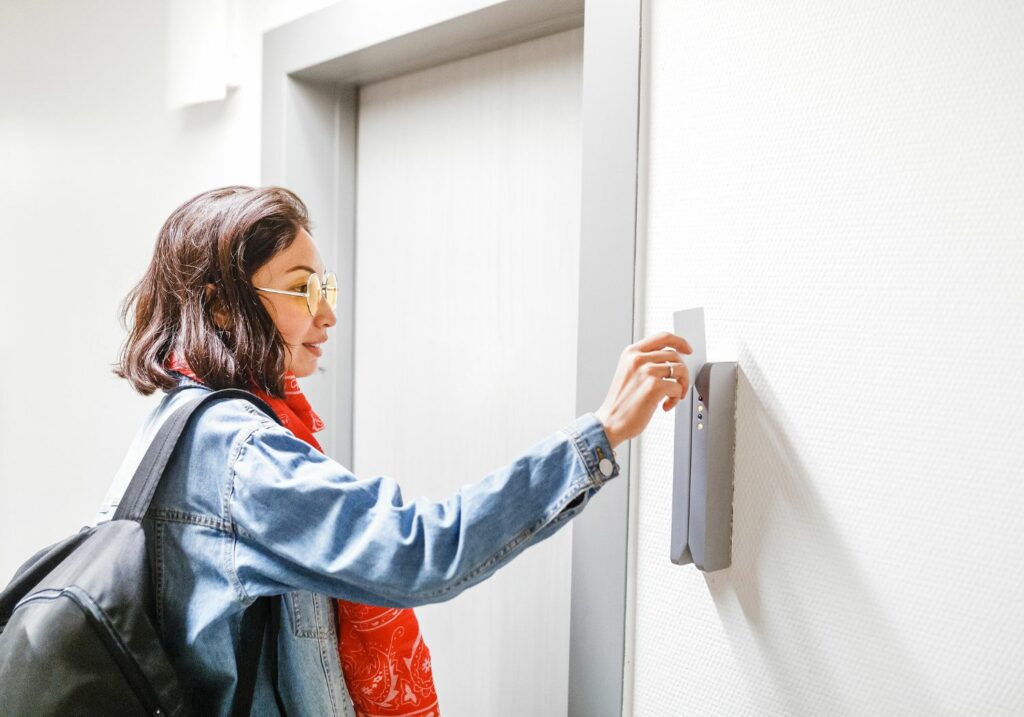
Both hotels and hostels can provide safe options, but the nature of shared accommodations means a higher risk than is offered at higher end hotels where you can lock your room.
Hostels
Many solo female travelers are put off by the safety concerns of shared dorms where both men and women stay.
The idea of going to sleep surrounded by men makes them feel uneasy and worried about their belongings or sexual harassment.
The reality is that these incidents are rare and most travelers have a positive experience. Theft and harassment in hostels is rarely reported by our community and can be mitigated if you choose to stay in a private room or a women-only dorm.
Pro tip: Stay at women only hostels like Hostelle in Amsterdam or pick a bed in a women-only dorm. They tend to smell better, be safer and quieter. Bonus points for getting tips from solo female travelers like you who know what it’s like to travel alone as a woman and will provide more relevant suggestions.
If it will help you feel safer, invest in a best self defense tool that may provide you with an additional sense of security no matter where you are. And always bring a lot of lockers for your suitcase and the shared lockers.
Hotels
High end hotels will have robust security measures in place, including secure access systems, surveillance cameras, and 24-hour front desk service, all contributing to a safe environment for guests.
Staying in private rooms reduces the risk of theft or unauthorized access to your personal belongings.
Hotels are also required by law in most countries to verify the identity of guests during check-in, enhancing overall safety within the premises. Hostels are too, but some of the more remote ones may sometimes overlook this requirement.
Isolated incidents such as thefts or security breaches can still occur, which is why it is best to always lock your room door, use the door bolt and, if you are staying at a hotel where you don’t feel safe, you should consider other hotel safety tips.
Location

While there isn’t a set rule determining where hostels or hotels are located, it is true that hotels tend to hog the premium views and locations in a destination, while hostels are sometimes a bit farther away from the city center, although close to public transportation.
Hostels
Hostels are designed for leisure travelers and not for business travelers so they are located in less expensive areas, off the city center though usually close to public transportation.
This location also helps them keep costs down while offering convenient links to the main sites.
Hotels
Proximity to attractions is usually really important when it comes to choosing accommodation. This is the reason why hotels often choose prime locations near popular tourist sites, making it convenient for guests to explore and experience the destination without extensive travel.
You’re also likely to find hotels in key locations that hostels don’t usually target because they carry a premium such as business districts, conference centers, major highways or airports.
The best views in a destination tend to be hogged by hotels rather than hostels. Someone at one point saw the potential the destination had and viewed the hostel as an opportunity to charge more for upgraded facilities.
Age Limitations

Hostels
You are never too old for hostels. Even though they started off as Youth Hostels, the majority welcome guests of all ages.
As more travelers in the boomer age group venture out solo and choose to stay at budget accommodations, hostels will only become more age-diverse.
If you are concerned that you may not fit in a specific hostel, you can see what other guests similar to you thought of their stay.
One of our community members, Margunn, says “On Hostelworld you can filter the reviews by age, so you can choose to see reviews from people in a certain age group first.”
Many hotels will ask for your age when you check in and place you in a dorm room with guests closer to your age group.
And beware of the unintended consequences of staying at a hostel, “Be cautious of the fact that people will think you appear younger than you are as you are traveling and staying in a hostel at 42. You may be consumed with a feeling of being cool.”, adds Marianna.
Pro tip: Older members of our community suggested picking the lower bunk beds in shared dorms to fend off mobility challenges.
Hotels
Hotels are generally open to guests of all ages, from families with children to older individuals.
Luxury hotels, resorts, or certain adult-oriented accommodations may have minimum age requirements.
All inclusive hotels on the other hand, tend to be chosen by families with children and may not be ideal for solo travelers, especially if they want peace and quiet.
Cleanliness

While we can’t say that either hotels or hostels are cleaner, and there are exceptions on both sides, the higher the category and price, the higher the chance an establishment will be clean.
This does not mean that hostels are dirty just because they are shared accommodation options, but in shared spaces with more people, tidiness might be more of an issue than when staying at a high end hotel which follows detailed cleaning protocols and procedures.
Hostels
Cleanliness in hostels can vary widely due to budget limitations and the guests staying there at the same time as you. Our community member Lisa Kuiro suggests choosing women-only dorms as they tend to be less smelly.
If you use shared facilities such as bathrooms and kitchens after everyone else, you are less likely to find them clean than if you were the first one as many rely on other guests being considerate and cleaning after themselves.
Pro tip: In shared dorms, body odor may be an issue during summer or in tropical destinations more often than they do in women-only dorms.
Bed bugs are one of the most feared consequences of staying at a hostel, even though the risk is not exclusive to hostels as proven by the bed bug infestations in Paris. To protect yourself, inspect the bed before getting in and consider bringing a bag liner.
Hotels
Hotels employ housekeeping staff who are professionally trained to maintain high cleanliness standards. Rooms are regularly cleaned, and linens are changed during a guest’s stay.
Reputable hotels often adhere to strict cleanliness and hygiene standards for all areas, including common spaces, rooms and amenities.
Many hotels undergo regular inspections and may have ratings or certifications that reflect their commitment to cleanliness and guest satisfaction.
If you are staying at an international chain hotel, you can be sure that they have additional protocols they need to follow helping you understand what to expect. If cleanliness is a critical factor for you, a 4 or 5-star hotel will guarantee a certain level you can typically rely upon, even if hotel category levels are not always certified by external parties across the world.
Bathrooms
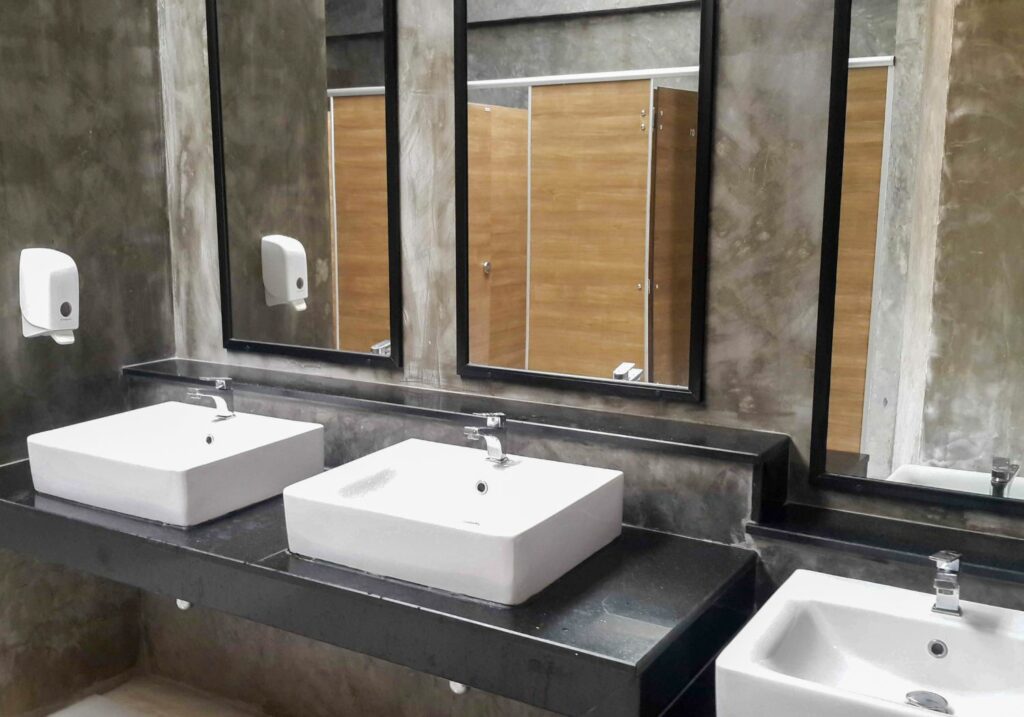
Because sharing a bathroom may be worse than sharing a room, many members of our community suggest private rooms with ensuite bathrooms in hostels as the best of both worlds: the privacy, safety and convenience of having your own room and the affordability and social aspect of a hostel.
Indeed this may be the best option if you are looking for an affordable stay and cannot commit to a shared bathroom, but if you want to splurge, only a high end hotel will have an outdoor bathtub with views over the African savannah or the sea.
Hostels
Sharing a bathroom is a major deterrent for many of our community members when considering a hostel stay.
The idea of communal showers and toilets and the issues with cleanliness that come with it, plus the practicalities of having to wait up on others, doing your makeup in your bunk bed and having to get changed in confined spaces are all reasons enough to book private ensuite rooms even in hostels.
If you are most concerned about saving on your trips, shared bathrooms and rooms are the way to go.
Hotels
Most hotel rooms come with private bathrooms for the exclusive use of the guests staying in that room. This provides a higher level of privacy and convenience.
These bathrooms are stocked with a range of amenities such as well-lit vanity mirrors, hair dryers, toiletries, towels, bathrobes, and slippers, and are cleaned daily by professional housekeeping staff.
Some of the best hotels in places like the Maldives have bathrooms with large stand alone bathtubs with incredible views and the shower of the lodge we stay at in the Serengeti on our Tanzania Luxe trip is open air and has views over the wildlife below. Imagine taking a shower while zebras, buffalo or even lions wander by.
Verdict
Your choice between a hotel or a hostel will depend on all of the previously discussed factors. Below I am listing who each of the two is best for.
Hotels are best for:
- Solo travelers who enjoy luxury
- Solo travelers looking for the highest levels of privacy and quietness
- Solo travelers who value convenience and the services of a concierge
- Families and couples looking for their own space
- Friends sharing and not looking to meet others
- Light sleepers and those who need quiet spaces to have a good night sleep
- Solo travelers with mobility difficulties who may need the hotel of staff to get around
- Solo travelers looking for a pampering and relaxing holiday where everything is done for you
Hostels are best for:
- Solo travelers looking for the most affordable option
- Solo travelers who are extroverted, outgoing and interested in socializing and meeting people
- Long term travelers digital nomads and backpackers that want to make their savings stretch further
- Solo travelers who like to party
- Friends who want to travel in the most affordable way

